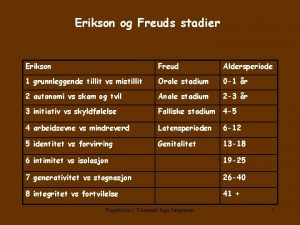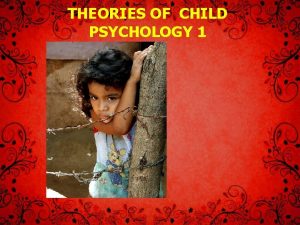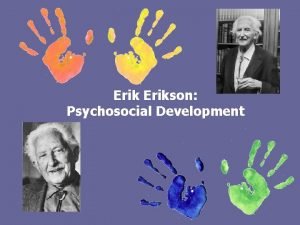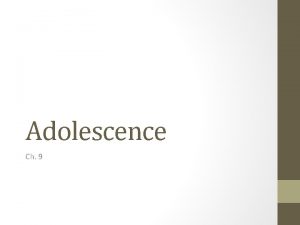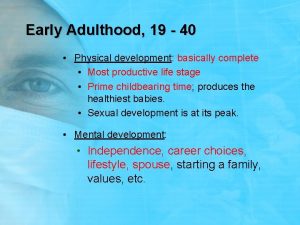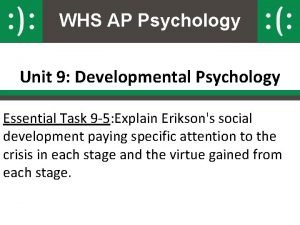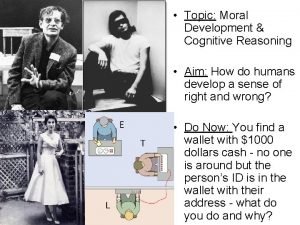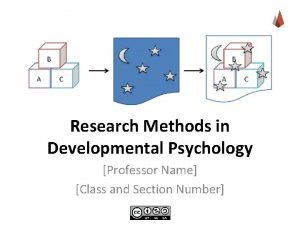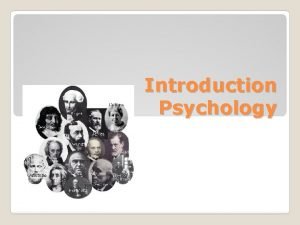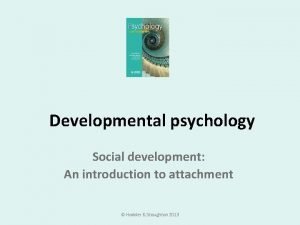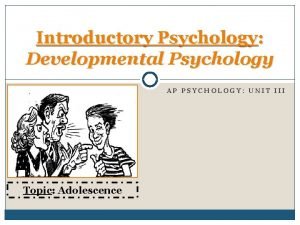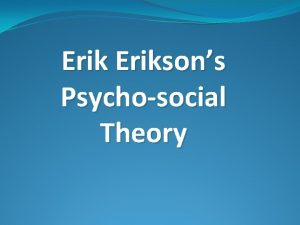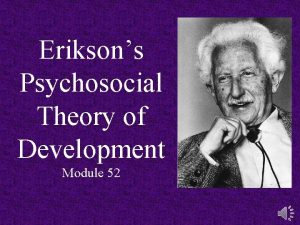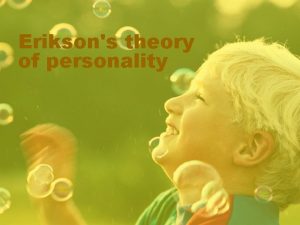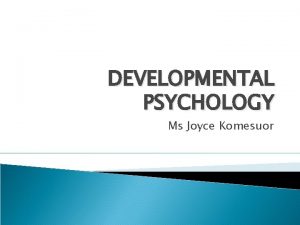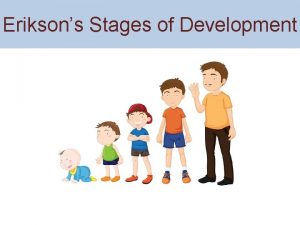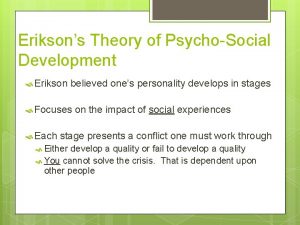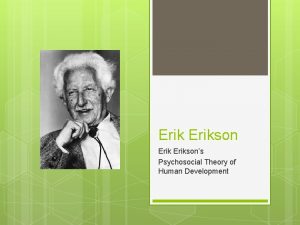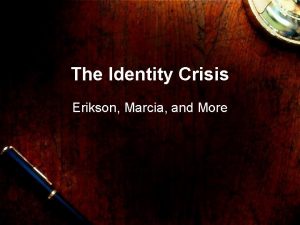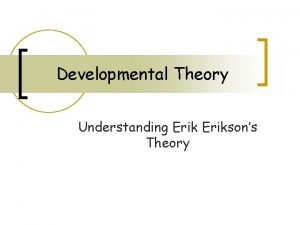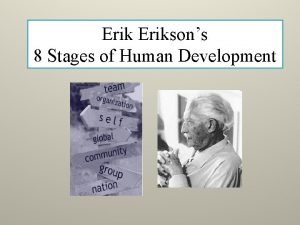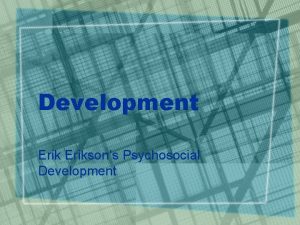Eriksons stage theory of identity DEVELOPMENTAL PSYCHOLOGY Erikson















- Slides: 15

Erikson’s stage theory of identity DEVELOPMENTAL PSYCHOLOGY.

Erikson As a person develops they are working out the similarities and differences between themselves and others. Erikson believed this journey of identity happened in a series of stages across a lifespan. Suggested that we face a specific psychosocial dilemma (a conflict between personal impulses and the social world) or “crisis at each stage of life. Resolving each dilemma creates a new balance between a person and society. A string of successes produces healthy development and satisfying life. Unsuccessful resolution can lead to children/adolescence/adults becoming stuck at a particular stage and then not developing normally.


Age - 0 -1 (infant) crisis – TRUST V MISTRUST. Trust is established when babies are given adequate warmth, touching, love and physical care. Infant is more likely to be securely attached. Mistrust is caused by inadequate and unpredictable care, and by parents who are cold, indifferent and rejecting. Infant more likely to be insecurely attached, lack confidence and positive expectations. Basic mistrust can cause insecurity, suspiciousness and inability to relate to others. Stage 1

Question: What effect can erratic parenting have on a child’s ability to trust?

Age – 1 -3 yo (toddler) Stage 2 crisis – AUTONOMY V SHAME AND DOUBT Toddlers are learning to walk, to feed themselves and to use toilets, so because autonomous and less dependant. Success at autonomy leads to self confidence and self control and mistakes are easily fixed or corrected. Overprotection or disapproval from parents can lead to shame and doubt on the toddler’s ability to be independent.

Child tries to help setting the table but knocks over a glass of water. What are the possible results of the parent scolding the child?

Age – 3 -6 yo (Early childhood) crisis – INITIATIVE V GUILT. Stage 3 Children’s social and motor skills become highly developed during early childhood and the dilemma for these children is to balance the wish to achieve more and take more responsibility while accepting parental control and discipline without guilt. Parents can reinforce initiative by giving children freedom to play, ask questions, use their imagination and choose activities. Feelings of guilt about initiating activities are formed if parents criticise severely, prevent play, discourage questions.

Age – 6 -12 yo (middle childhood) crisis – INDUSTRY V INFERIORITY Stage 4 industry can be regarded are competence and this is achieved through learning at school. Children learn a sense of industry when they win praise for productive activities such as building/painting/cooking/reading. If the child’s efforts are regarded as messy, childish or inadequate, feelings of inferiority result.

Age – 12 -18 yo (adolescence) Stage 5 crisis – IDENTITY V ROLE CONFUSION. Primary task during this stage is to answer the question “who am I”. Adolescents must build a consistent identity out of their talents, values, life history, relationships and the demands of their culture. Conflicting experiences as a student, friend, son, daughter, worker etc. must be integrated into a unified sense of self. People who fail to develop a sense of identity suffer from role confusion, an uncertainty about who they are and where they are going.

Age – 18 -40 yo (early adulthood) crisis – INTIMACY V ISOLATION. Stage 6 Individual feels a need for intimacy in this stage. After establishing a stable identity, a person is prepared to share meaningful love or deep friendships with others. (intimacy = ability to care about others and share experiences with them) Failure to establish intimacy with others leads to a deep sense of isolation (feeling alone and uncared for).

Age – 40 -65 yo (middle adulthood) Stage 7 crisis – GENERATIVITIY V STAGNATION Main focus is on work and the maintenance of family relationships. Generativity (caring about oneself, one’s children and future generations) can be achieved by guiding one’s own children or by helping other children, as well as productive or creative work. A person’s concerns must broaden to include the welfare of others in the society as a whole. Failure to do this leads to self centeredness, person feeling bitter, trapped and dreary.

Age – 65+ (late adulthood) crisis – INTEGRITY V DESPAIR Time to reflect on ones contributions and to view it as positive and satisfactory or as disappointing/unsatisfactory. If life is fulfilled an older person can view death with a sense of integrity. If not, death will be despaired/feared. Stage 8

Evaluation of Erikson Contributions good face validity. Many people find that they can relate to his theories about various stages of the life cycle through their own experiences.

Evaluation of Erikson Criticisms of theory. Vague on the causes of development, no clear universal mechanism for crisis resolution (i. e. what kid of experiences must people have in order to successfully move stages/resolve conflict). No Not attention to cognitive development scientific.
 Sigmund freud and erik erikson
Sigmund freud and erik erikson Industry erikson
Industry erikson Freud stadier
Freud stadier Erikson stages of development
Erikson stages of development Developmental stage theories
Developmental stage theories Identity vs inferiority
Identity vs inferiority Developmental tasks for adolescent
Developmental tasks for adolescent Muscular-anal stage
Muscular-anal stage Emotional development of early adulthood
Emotional development of early adulthood Initiative vs guilt
Initiative vs guilt Lawrence kohlberg developmental psychology
Lawrence kohlberg developmental psychology Research methods in developmental psychology
Research methods in developmental psychology What is psychology
What is psychology Attachment developmental psychology
Attachment developmental psychology Personal fable ap psychology
Personal fable ap psychology Devonte is a graduate student in developmental psychology
Devonte is a graduate student in developmental psychology


